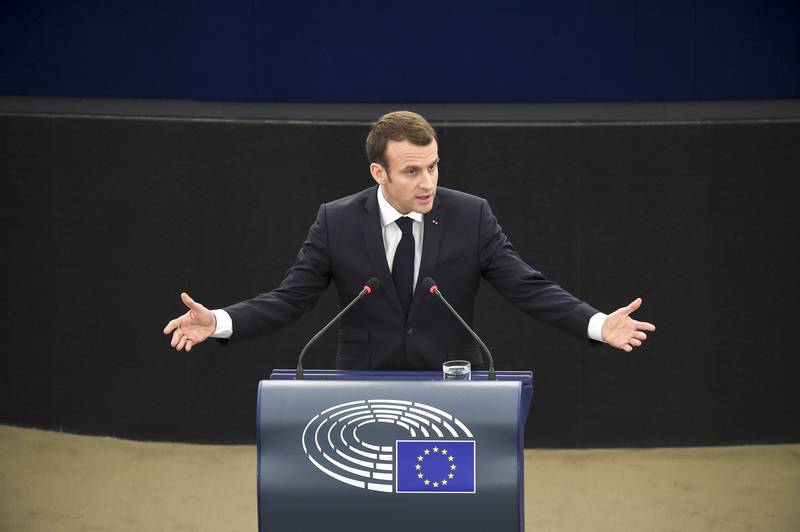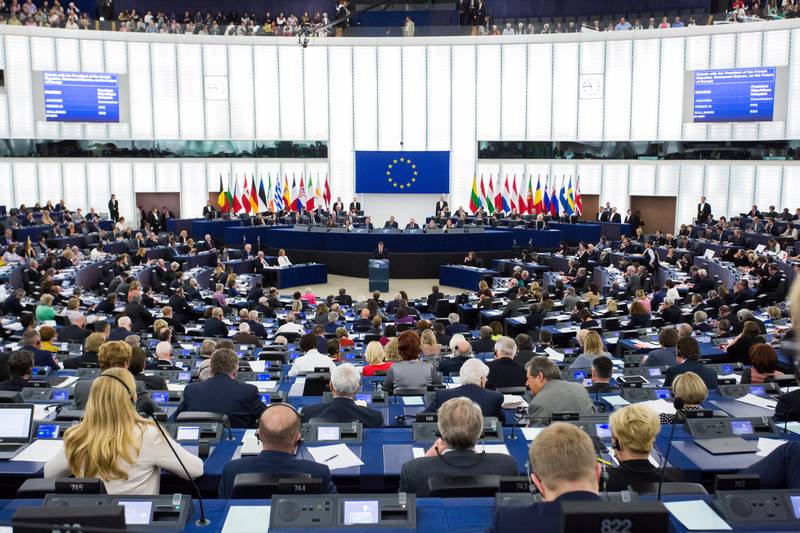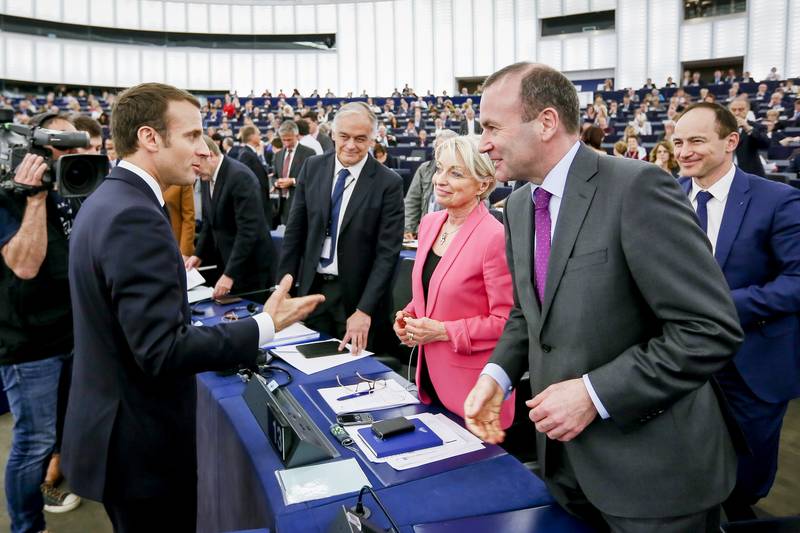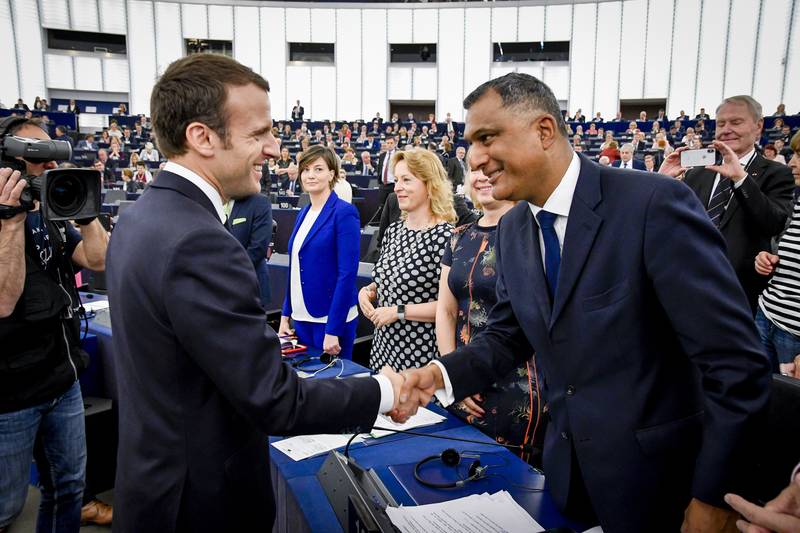Emmanuel Macron's Democracy vs. Manfred Weber's
Adelina Marini, April 25, 2018
 There were big expectations for French President Emmanuel Macron's address in the European Parliament that he would try to breathe new energy into his big plans for the future of the EU and, most of all, the deepening of the integration of the euro area because of the cool winds that came from Berlin after the formation of the long-expected ruling coalition. A lot of prominent journalists and analysts were left disappointed. In his introductory statement before the MEPs in Strasbourg, on 17 April, he touched upon these issues just vaguely.
There were big expectations for French President Emmanuel Macron's address in the European Parliament that he would try to breathe new energy into his big plans for the future of the EU and, most of all, the deepening of the integration of the euro area because of the cool winds that came from Berlin after the formation of the long-expected ruling coalition. A lot of prominent journalists and analysts were left disappointed. In his introductory statement before the MEPs in Strasbourg, on 17 April, he touched upon these issues just vaguely.
There were several pieces of news in his speech, which is part of the series "On the Future of Europe" - almost every month a member state leader addresses the MEPs to share their views about the future of the Union. Since the beginning of the year, in Strasbourg appeared the prime ministers of Ireland and Portugal - Leo Varadkar and Antonio Costa. By the end of the year, many more heads of state or government will articulate their views, as German Chancellor Angela Merkel's turn will be in November.
So, what to remember Macron's speech with?
First of all, it was unusually short - just 20 minutes against the backdrop of his one-hour address in Davos in the beginning of the year, or his European speech in the Sorbonne. The second piece of news is that he admitted that, at the moment, there are no conditions for bigger reforms in the euro area. The third and very unpleasant piece of news is that he took enlargement hostage by saying he would not support any further expansion until the EU is deepened and consolidated. Against the background of the focus of his speech, namely liberal democracy, this significantly puts away the Western Balkans' European perspective, moving it far beyond the horizon (on this issue euinside is planning a separate text).
His 3-hours long debate with MEPs produced also a deepening of the, until recently indirect, conflict between Mr Macron and the leader of the biggest political group in the EP Manfred Weber (EPP, Germany). In the same time, the attempts of various political groups in Strasbourg to attract on their side Macron's political movement "En Marche!" have become more evident as it is not a member of any of the political families in Europe.
EU is in a civil war
As a matter of fact, the French president did not speak of the future at all, only about the past and the present, and with a tone of warning at that. "And month after month we are seeing views and sensibilities emerge which call into question certain fundamentals. There seems to be a sort of a European civil war. National selfishness and egotisms seem to take precedence over what brings us together. There is a fascination with the illiberal and it is growing all the time", he began. He dedicated a large part of his speech to the emergence of authoritarian forces that have a clear strategy to destroy the multilateral system in which Europe is trying to find its place.
To him, the future is about defending the European values. "If we decide to give up on democracy and our attachment to democracy and everything that goes with it we will be on the wrong track", Emmanuel Macron said. He reminded the European Parliament that it is a temple of European democracy and is a miracle. "You deliberate together, respecting difference with the heavy weight on it, a history that divided us. And that is a unique model in the world. This is a treasure that we made come alive and which we kept alive for more than 70 years", he told the MEPs some of whom probably understood that he offered them an idealised image of a parliament which, in reality, reflects without refraction those same divisions and burden.
Which is why he did not miss to recall what makes Europe different from the others in the world. "Look around, let's compare each other, let's compare Europe with the other powers which some are fascinated by because, allegedly, are more efficient. Where else in the world are there the same requirements - financial, diplomatic, geopolitical, economic, the obligation to respect minorities, gender  equality, respect for private life? Where else is this so developed in the world?", Mr Macron asked and attacked the eurosceptics and populists for only criticising without offering an alternative.
equality, respect for private life? Where else is this so developed in the world?", Mr Macron asked and attacked the eurosceptics and populists for only criticising without offering an alternative.
He said that people have not given up on Europe. On the contrary. Individual politicians did that and this is a treachery, he added. "I don't want to belong to a generation of sleepwalkers. I don't want to belong to a generation that has forgotten its own past, that refuses to see the torments of the present", the French head of state added. He was strongly applauded many times during his speech.
Macron vs Weber
The French president believes that new life can be breathed in Europe only if it goes back to the origins of democracy. He repeated his idea of holding democratic debates across Europe about the future which, in his mind, will put the foundations of a European democracy. The aim is to avoid the simplistic approach of answering with "yes" or "no" to questions that are not at all addressed in depth. Macron believes these debates will bring democracy back to life. He urged MEPs to get involved. "I want to belong to a generation that wants to defend its democracy. It is not a word that we should become used to. It is a word with a meaning because it has emerged from the battles of the past", the president of France added. "I want to organise real European debates. We want a Europe that is based on true democracy", were his final words before the beginning of the debate in the chamber.
Next spoke the president of the European Commission, Jean-Claude Juncker (Luxembourg, EPP), who welcomed Emmanuel Macron's speech with the words: "The true France is back!" and said that the Commission backs him entirely in his mission. He reminded him, though, that Europe is not only France and Germany. Juncker sounded jealous regarding the citizens' debates recalling that the Commission has so far organised over 500 dialogues with citizens in the entire EU. "I would encourage the French president, the government, the minister of foreign affairs, to turn this into a massive event not only in France but across Europe. The history of tomorrow is being written today and I want us to write it together", Mr Juncker concluded and received a wink of approval from the French president.
The leader of the European People's Party group in the EP, Manfred Weber, chose to speak in English. He welcomed Macron for his pro-Europeanness but explained that he sees democracy differently. According to him, the only valid democracy is parliamentary democracy. "What makes parliamentary democracy such a strong force? It gives people a say and brings them together. When my voice matters, I care, I engage, I belong, and I am willing to work for a greater common good. And what if my voice does not count? Then it starts to feel like this is not my Europe", said Manfred Weber, who  enraged the whole of Europe with his uncritical support for Viktor Orban during the election campaign in Hungary, during which the anti-semitic and xenophobic messages prevailed.
enraged the whole of Europe with his uncritical support for Viktor Orban during the election campaign in Hungary, during which the anti-semitic and xenophobic messages prevailed.
"President Macron, just take a look around here. The Chamber of the European Parliament is the right place to discuss this. Every citizen is given a voice here. You can find Communists, you can find Conservatives, Christian Democrats, Liberals, Greens, Social Democrats and even right-wing extremists. Some people call this old Europe: I call this democratic Europe", continued the German MEP. Then, he moved to defending the leading candidates procedure, also known as Spitzenkandidaten, which was for the first time applied in the 2014 European elections but the French president blocked it for the 2019 elections because the Parliament refused to support his demand for the first time to test a transnational list next year, as euinside wrote.
The EPP group leader also said that the Commission president is the only one elected in this way. This procedure should be applied for the election of a European Council president, as well. There is also no pan-European referendum, he went on. "There is simply only one event where all Europeans together are asked for their opinion on Europe", Manfred Weber explained and again stressed that true democracy is in the European Parliament. Then, he told a story from his youth about a group of young people in Munich who were arrested by the Nazis in 1943 for spreading pamphlets calling for resistance against the Nazis. He even quoted one of these fliers: "The imperialist idea of power must be disarmed whatever side it comes from, for all time. [...] Freedom of speech, freedom of confession, protection of individual citizens from the arbitrariness of violent criminal states, these are the foundations of a new Europe".
The leader of the Liberals in EP, Guy Verhofstadt (ALDE, Belgium), countered him stating that he had better sent this pamphlet to Viktor Orban instead of a congratulations address. "The OSCE has recently published a report on the elections in Hungary and I will quote it: 'Intimidating rhetoric, and xenophobic rhetoric by media. Opaque electoral funding'. This is pretty much the same words the OSCE used when Putin was elected. There is no place for illiberal states in our union", the former prime minister of Belgium emphasised, choosing for the first time in a long time to speak French. Usually, his statements in the plenary are in English.
Responding to Manfred Weber's challenge that the parliamentary democracy is better than the democracy of citizens' debates, Emmanuel Macron said that he deeply believed in parliamentary democracy. In the same time, however, he also believes in the division of powers. The parliament has some powers, the Commission others, and the Council has its own. "And if you want to change that you have to ask the people. So, saying that this particular competence would go to one or another that is not something we can do so easily", Macron warned and went on: "I believe in parliamentary democracy, I believe in the freedom of expression, in democracy and that is precisely why I want to suggest transnational lists. If you believe in the vitality of democracy and the peoples you should not just believe it when you get together with parties, for elections, with a rate of turnout that we're seeing today".
Mentioning the low turnout rates in European elections was a heavy blow for Manfred Weber. Voter turnout reached its lowest level in the 2014 elections when only 42.61% voted for MEPs. Macron continued his attack by saying that it is odd to deny everything and reduce democracy to just a parliamentary democracy when, in fact, it is all about existing, structured parties with mainly national logic. According to the French president, the leading candidates procedure is good but he recalled that he is not part of any political family.
According to publications in European media, the French president's movement is actively preparing to shuffle the cards for the next European elections hoping to form a political group of his own, which will be capable of attracting all the centrist and strongly pro-European members. During the debate in Strasbourg on 17 April something really interesting happened. The leader of one of the eurosceptic groups in the EP - the European Conservatives and Reformists - extended a hand of  cooperation to Emmanuel Macron. This was quite unexpected. The group leader, Syed Kamall (ECR, UK), made an unusual compliment to the French president:
cooperation to Emmanuel Macron. This was quite unexpected. The group leader, Syed Kamall (ECR, UK), made an unusual compliment to the French president:
"The European Conservatives and Reformists (ECR) Group welcomes a leader with a bold vision and a desire to shake things up, for too many national politicians praise the idea of ever-closer union when in Brussels or in Strasbourg, but when they return home their support for the European project of further political integration becomes a barely audible whisper. Monsieur le Président, what you say in Paris is what you have said here in Strasbourg, and that is to be respected", Mr Kamall said. He recalled that there are some essential differences in the views of his group and Mr Macron's but, nevertheless, he offered him his support.
"While I may be one of a number of MEPs who will not return to this Chamber after the 2019 elections, the ECR Group will continue to fight for a vision of a reformed European Union. We will continue to oppose calls for ever more political integration, but where there is common ground the ECR Group hopes to work with you to shape a reformed European Union which respects all Member States and their citizens". The biggest appetites for Macron's party have the Liberals as they are the closest in terms of views.
No big projects for the euro area
The most surprising part in the French president's speech in EP was his reconciliation with the fact that there will be no big upgrade of the EMU. He mentioned in passing by that the euro area reform has to be completed by the end of this term, which includes, in his own words, the banking union and creating a fiscal capacity for the eurozone. Both, however, are stuck in ideological disputes. It seems most realistic at this stage, when it comes to the banking union, to reform the euro area permanent bailout fund by turning it into a financial backstop for the single restructuring fund and into a European Monetary Fund. A fiscal capacity for now is being rejected.
Macron admitted that he wants to see greater ambition for the EMU but said that in the short-term priorities must be reordered. His answers to questions of MEPs on this issue made it clear that he is fully aware of what is expected of him: "Yes, at the level of our countries as well we have to take the reforms which are in line with the European semester. These are responsibilities we have as member states. That is what I decided for France and what I proposed to the French voters".